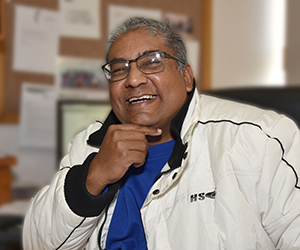Latest News Archive
Please select Category, Year, and then Month to display items
14 June 2024
|
Story Anthony Mthembu
|
Photo Suplied
 Jeremiah Hlahla, a UFS student completing his PhD in Botany at the University of Debrecen as part of an exchange initiative funded by the Erasmus+ Mobility Programme.
Jeremiah Hlahla, a UFS student completing his PhD in Botany at the University of Debrecen as part of an exchange initiative funded by the Erasmus+ Mobility Programme.
As part of an exchange initiative facilitated by the Erasmus+ Mobility Programme, Jeremiah Hlahla, a student at the University of the Free State (UFS), is nearing the completion of his PhD studies at the University of Debrecen in Hungary. Hlahla’s journey, which began in February 2024 and is set to conclude in July 2024, has been a remarkable learning opportunity. “As a first time-traveller to Europe, I have thoroughly enjoyed engaging with people from different countries and cultures,” he said.
The benefits of international collaboration
Hlahla is currently pursuing a PhD in Botany, focusing on plant stress physiology. “My current PhD project investigates the physiological, biochemical and morphological responses of vegetable-type soybean, or edamame, to combined drought and heat stress,’’ he explained. He considers the University of Debrecen the ideal institution to complete his research due to its extensive expertise and resources in similar projects. He noted that his colleagues at Debrecen conduct significant work on plant protection against biotic and abiotic stresses, including salt and drought stress, as well as proteins and amino acids in barley and other legumes.
Given the vast knowledge available on similar projects, Hlahla has found substantial engagement with his work at the University of Debrecen. “Upon arrival, I delivered an introductory lecture presenting my UFS project on the synergistic effects of combined drought and heat stress on the physiology and biochemistry of edamame. It was an engaging session as everyone could relate to my work and asked many questions,’’ he said.
Insights gained from the exchange
Hlahla has also gained valuable lessons that will assist him in his research career, including biotechnology and physiology tools. “I learned how to prepare samples and use high-performance liquid chromatography (HPLC) and reversed-phase ultra-high-performance liquid chromatography (UHPLC) to quantify proteins and amino acids,’’ he said. These techniques are beneficial not only for his current work but will also support future soybean research.
As his experience at the University of Debrecen nears its end, Hlahla reflects on the collaborations and friendships he has formed, which stand out as a significant highlight.
UFS Professor on his new book on Boko Haram
2017-02-01

Prof Hussein Solomon, Senior Professor
in the Department of Political Studies and
Governance at the UFS and co-editor of the
book titled Understanding Boko Haram:
Terrorism and Insurgency in Africa.
Photo: Charl Devenish
Understanding the nature of the Boko Haram insurgency in northeast Nigeria is exactly what Prof Hussein Solomon from the Department of Political Studies and Governance at the University of the Free State (UFS) has set out to do.
Understanding the emergence of Boko Haram
Prof Solomon says tens of thousands of people have been killed in northeast Nigeria and neighbouring states as a result of the violence unleashed by the terrorist group. With the help of his co-editor, Prof Jim Hentz, who is an army colonel and lecturer at the Virginia Military Institute in the US, they set out to “understand the emergence of Boko Haram in a historical, sociological, economic and political context”.
In his book, titled Understanding Boko Haram: Terrorism and Insurgency in Africa, Prof Solomon “seeks to understand the emergence of Boko Haram in a historical, sociological, economic and political context”.
Book launch to take place in Chicago in the US
In his previous book, Islamic State and the Coming Global Confrontation, he analyses the origins and organisational structure of the Islamic State. Although an entirely new topic, but within the broad theme of political Islam, this book focuses more on how Boko Haram has become part of the Islamic State’s franchise in West Africa.
The book, which took more than a year to write, is based on secondary research, followed by primary documents and interviews done on the ground in Nigeria. It will be of much interest to students of terrorism and political violence, insurgencies, African politics, war and conflict studies, and international relations in general.
The official launch will take place at the African Studies Association’s annual meeting and takes place from 16-18 November 2017, in Chicago in the US.